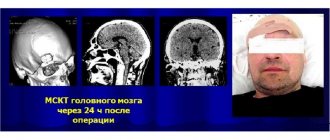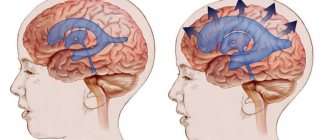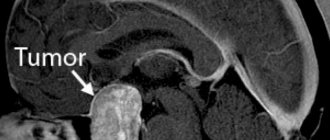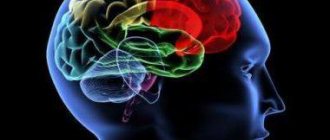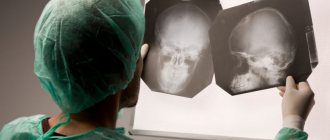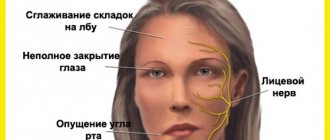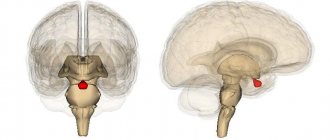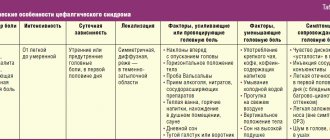1. Meningioma of the brain
Meningioma
is a tumor that forms on the membranes covering the brain and spinal cord inside the skull. Tumors form on three layers of membranes called meninges.
Meningioma is usually a benign tumor
(in 90% of cases), which means it is not an oncological disease.
Some brain meningiomas are classified as atypical
.
This is an intermediate state - the tumor is considered neither benign nor malignant. But in this case, there is a risk that the meningioma may develop into a cancerous tumor. Malignant meningioma,
unlike benign meningioma, grows quickly. And it can spread (metastasize) to other parts of the brain and other organs. Metastases often appear in the lungs.
Most meningiomas form on the membranes of the brain. Less common are meningiomas that grow on part of the spinal cord.
In general, brain meningioma is the most common type of tumor affecting the human nervous system. This pathology occurs more often in women than in men. According to statistics, meningioma develops in middle-aged women three times more often than in men. Most tumors are diagnosed in patients between 40 and 70 years of age. Very rarely this disease occurs in children.
Often, brain meningioma does not cause any unpleasant symptoms and does not require urgent treatment. But the growth of benign brain meningioma can cause serious problems over time. In some cases, even death.
A must read! Help with treatment and hospitalization!
Treatment of brain tumor with herbs.
Brain tumors appear rarely (about 2%), relative to other primary tumors. It is necessary to distinguish between primary (arising in the brain itself) and secondary (metastases to the brain) brain tumors. Primary tumors are almost always diagnosed late, because blood tests are almost always good, and periodic headaches are well eliminated by taking various pills.
And only the occurrence of constant, severe headaches begins to cause anxiety. Metastasis to the brain most often occurs from lung cancer, less commonly from breast cancer, renal cell carcinoma, melanoma, prostate tumor and lymphoma . Knowing the patterns of metastasis from these tumors, patients with these diseases should more often pay attention to headaches, as well as enlarged supra- and subclavian lymph nodes.
Secondary brain tumors are easier to diagnose but more difficult to treat. There is a wide variety of brain tumors, among which the most common are meningiomas - tumors of the meninges (up to 30%) and astrocytomas (up to 70%) - tumors arising from astrocytes, which primarily perform a supporting function. Of particular note is glioblastoma, the most malignant variant of astrocytoma, which most often occurs in mature and elderly men. Astrocytes perform many different complex functions in the brain, hence the difficulty in treating tumors arising from these cells.
The degree of malignancy of a tumor is determined by such indicators as invasiveness (the ability to penetrate into adjacent tissues), tendency to necrosis (destruction of internal tumor tissues), cell homogeneity (tumor cells of different or identical structure), mitotic activity (activity to divide the tumor), etc. d. Recently, even the study of tumor cells for histology (structure) does not always provide a complete picture of the tumor, since mixed type tumors often develop.
In addition, one type of tumor may develop into another as it progresses. Very often, after irradiation of a low-grade tumor, patients receive a very aggressive high-grade tumor. But, by and large, histology, the location of the tumor, is very important for official medicine, surgery, and radiation.
What is important for the patient is the appearance of a headache, possibly vomiting, dizziness, epileptic seizures, loss of coordination, speech, and memory. The simplest examination option is to conduct a magnetic resonance imaging (MRI) of the brain to determine the size and location of the tumor, and the presence of fluid around the tumor.
Increased intracranial pressure occurs as a result of an increase in brain volume, impaired circulation of blood and cerebrospinal fluid (the fluid that fills the cavities of the spinal cord and brain), and as a result of cerebral edema. It often happens that a small tumor causes quite large swelling of the brain, completely paralyzing one side of the person. Brain edema, ischemia (lack of blood supply), impaired oxygen circulation, cause not only metabolic disorders in the nervous tissue and death of nerve cells, but also compression and displacement of healthy brain tissue, which means impaired speech, coordination of movement, etc.
The same picture is observed with both benign tumors and malignant tumors - intracranial pressure also increases, brain swelling appears, compression of healthy tissues occurs, therefore an untreated benign tumor leads to the same consequences as an untreated malignant one. In addition, as noted above, tumors can degenerate into malignant ones.
Official medicine insists on surgical treatment followed by irradiation of the tumor site. The operation is effective in cases of benign or low-grade tumors, i.e. when it is possible to completely remove the tumor. In cases of aggressive tumors, such as anaplastic astrocytoma, lymphoma, anaplastic ependyoma or glioblastoma, it is never possible to radically remove the tumor, due to the deep penetration of the tumor into adjacent tissues that cannot be removed. At the same time, the surgeon, trying to remove the tumor, begins to cut it, creating the appearance of removing the tumor... In fact, after 3-4 months the large one receives the same tumor, only growing more aggressively.
In this case, the true size of the tumor significantly exceeds the visible one. It is believed that removal of the bulk of the tumor by the surgeon creates favorable conditions for subsequent auxiliary treatment - radiation. In fact, when a tumor is dissected, subsequent rapid growth of the non-removed part of the tumor is observed; sometimes hemorrhage occurs in the bed of the removed tumor, which immediately makes the patient disabled. Radiation is used only on operated high-grade tumors, which are more sensitive to this type of treatment.
The prognosis for such treatment of high-grade tumors is not comforting: a fifth of patients live up to one year. Chemotherapy is more effective for secondary tumors, but even here the prospects are not encouraging.
Traditional medicine suggests treating brain tumors independently and improving the condition of patients when treated with official medicine. The key to proper treatment is to reduce swelling, intracranial pressure and headaches, reduce paralysis, reduce the size of the tumor and its complete disappearance. The selection of medicinal herbs must be approached with caution - what is successfully used in the treatment of other tumors may be a contraindication for the treatment of brain tumors.
For example, the drug Immunal (based on Echinacea purpurea juice) reduces the contractility of the lymph nodes, which leads to increased stagnation in the lymph and brain. Valerian , in such patients, causes sleep disturbances, difficult dreams, and even an stimulating effect instead of a calming one. Tincture of aconite jungaris , often used in advanced stages of cancer, can cause severe swelling of the brain here. Pantocrine and Schisandra are not suitable for treatment , and apilak (royal jelly) can cause rapid growth of the tumor itself. And so on, the list is quite long...
On the contrary, cow's milk and whey , which are not usually used in the treatment of cancer, have been successfully used in brain therapy.
1. General recommendations for all types of brain tumors.
It is necessary to completely abandon table salt and any sources of sodium, using potassium, calcium and magnesium supplements instead. It must be remembered that a lack of potassium and calcium in food enhances the effect of excess sodium, and a lack of magnesium increases the permeability of cell membranes. To maintain mineral balance, it is recommended to take any seaweed, preferably washed seaweed or brown seaweed, or even better, red seaweed. You can use table salt substitutes, hyposol or sanasol. It is not recommended to eat cheeses, sauerkraut, celery, mustard, dried fruits - foods high in sodium.
In your diet, you need to avoid any hard-to-digest foods, as well as foods that cause flatulence: red meat, legumes (soybeans, peas, beans), kefir, kvass.
Drinking large quantities of water is not recommended , especially if you have low protein levels, as this will worsen cerebral edema and increase the pressure of cerebrospinal fluid on the brain. When selecting herbs, make sure that the medicinal complex does not include herbs that reduce the density of the vascular wall.
If you have any problems with your head, you should not think or scream - all this increases swelling of the brain. You need to listen to pleasant, calm music, preferably with your eyes closed, walk in pleasant weather, and in case of exacerbation of headaches, complete rest and sleep is recommended.
For headaches , especially at night, a hot foot bath or continuous massage rubbing of the feet helps until the pain subsides or the patient sleeps. Massage should provide only pleasant sensations; it is better to use superficial massage (various types of stroking), excluding deep kneading.
Various therapeutic bandages and lotions on the frontal region, including the temples, and on the occipital region, spreading to the neck, are good for increasing the outflow of fluid from the brain Dilute any clay (blue clay has worse reviews) in table vinegar and apply a layer of 5-7 mm. on the indicated places for 2 hours, do not cover with anything, then bury the clay in the ground. Red clay diluted in children's urine (children under three years old) has a faster and stronger healing effect. You can make a bandage from steamed herbs, wrapping them in 1 - 2 layers of gauze and putting them on your head like a roll. The bandage should not interfere with blood circulation and should not put pressure on the head. For the dressing, use the following herbs: violet, linden blossom, sage, yarrow pine needles and crushed cones of common juniper have a very good effect . herbal cap is in good condition, you can leave it for 6–8 hours.
As an immunomodulator, it is better to use injections of Thymalin. intramuscularly at night, 10 days in a row. You should not get carried away with increasing the dosage of Thymalin , which supposedly increases the effectiveness - large doses of Thymalin can cause additional brain swelling... You can also use t-activin according to the instructions. Do not increase standard doses; swelling is possible.
Among herbal adaptogens, a decoction of saffron with golden root . Pour two teaspoons of saffron stigmas with a glass of hot milk. Leave in a thermos for two hours. Take 1 - 2 tablespoons of warm milk infusion with 20 drops of rosea radiola tincture 3 - 4 times a day. The recipe strengthens the walls of blood vessels, strengthens memory, and renews brain cells.
For convulsions, epileptic seizures, as well as strengthening the walls of blood vessels in the brain, mistletoe infusion is used. Pour one tablespoon of chopped mistletoe branches into a glass of boiling water and leave for 2 hours in a warm place. Take 50 - 100 ml. 3 times a day. Can be taken for a long time, in the absence of intoxication.
The condition is significantly improved by constant intake of infusions of raspberry, rosehip, mint and blueberry leaves. Instead of blueberry leaves, you can use fruits. Raspberry and rose hip leaves cannot be exchanged for fruits. Brew the leaves in any concentration, you can add honey . The pleasant-tasting infusion can be successfully used to treat brain tumors in children , in whom such tumors develop much more often and faster.
Tincture of poisonous vekha root. To prepare the tincture, use a ratio of 20 g. dry root (preferably 50 grams of fresh) per 1 liter of vodka. Leave for 2 weeks, strain. Start taking small doses at first. For example, the first 2-3 days, 1 drop 1 hour before breakfast and lunch with ¼ glass of water. It is better to drip the tincture into an infusion of mint or violet , which is infused in the ratio of a tablespoon of herb to a glass of boiling water. For the next 2-3 days, take 2 drops of Vekha tincture 2 times a day. If the condition is satisfactory, you can reach 5 or even 7 drops 2 times a day. Then reduce the dosage to 1 drop, 2 times a day and take a break. During the evening reception, it is better to give a tincture of wolf bast fruits, prepared at the rate of 500 ml. 70% alcohol per 15 g. ripe dry fruits. Leave for 2-3 weeks. Take wolfberry tincture in the same way as Vekha tincture , i.e. 2-3 days, 1 drop, 2-3 days, 2 drops, etc. The dosage can be increased to 10 drops per dose only if the condition is consistently good. Children usually tolerate plant poisons very well , but the dosage for them, even with very good treatment, is better not to exceed 3 drops per dose. Tinctures of Vekha and Wolfweed can be taken for about 1 year. You can try giving it orally instead of vekha and tincture of speckled hemlock ; as practice shows, when it is used, attacks of epilepsy, pain, and disturbances of consciousness occur much more often .
IMPORTANT. Especially when adding plant poisons (hemlock, aconite, vekh, wolf's bast, colchicum, etc.) to the herbal intake regimen, which often inhibit or even completely block the movement of lymph, also add herbs to stimulate the cleansing of the lymphatic system . This will reduce the production of cerebrospinal fluid and its pressure on the brain.
The addition of guide herbs in the treatment of metastatic brain tumors makes it possible to stop the growth of such tumors. The selection of herbal guides must be approached carefully, taking into account the specific location of the tumor, its histology, and patient tests.
2. For benign tumors and tumors with a low degree of malignancy.
Horsetail extract in 60% alcohol, in a ratio of 1:5, is a strong antioxidant for the brain. Use no more than two weeks.
Tinctures of Astragalus membranaceus and Atractylodis ovicephalus with citrus peel. Tincture of astragalus and atractylodis is prepared from crushed roots in 70% alcohol in a ratio of 1:10. Leave for 2 weeks in a dark place. Pour boiling water over the peels of citrus fruits (preferably tangerines) for 2 hours, at the rate of 2 tablespoons of peel per glass of boiling water. Strain. Take 1/3 cup of infusion with 15 drops of astragalus tincture and 15 drops of atractylodes tincture 3 times a day. Can be taken for 2 – 3 months. The recipe gives quick results for benign tumors, tumors with a low degree of malignancy, but it cannot be used for tumors with a high degree of malignancy, especially when the tumor size exceeds 2 centimeters.
A decoction of flowering branches of Kuril tea in milk , at the rate of a tablespoon per glass, boil over low heat for 10 minutes, take on an empty stomach with a small amount of honey, ½ cup 2-3 times a day. The recipe is well suited for people with dysbiosis, liver dysfunction, and the elderly. This tasty decoction can be taken for 2-3 months.
3. For aggressive tumors with a high degree of malignancy.
The problem in the treatment of brain tumors is that the fluid that accumulates around the brain tumor increases intracranial pressure, wedges the brain into any relatively free areas of the skull, and at the same time compresses the blood vessels of the brain, interfering with treatment by any means, including herbs. The use of medications gives a small and temporary effect. therapeutic agents with low molecular weight can help , allowing them to easily pass into the tumor tissue and destroy it.
For aggressive types of brain cancer, an aqueous extract of herbs that is tropic to brain tumors, the so-called anti-cancer conductor . The drug can be used both externally and internally. The results are visible after 3 months, and the first results after 1-1.5 months - for example, a person who hardly spoke or spoke without coherent speech begins to speak quite clearly. Gradually pass
attacks of headaches and partial paralysis. The conductor helps conduct active substances into the tumor and easily penetrates there, destroying the DNA of the cancer. The effectiveness in the initial stages is 90% , and does not require the administration of dexamethasone or radiation or chemotherapy.
As the tumor grows, the increased excitability of the nerve cells of the cerebral cortex is replaced by a state of inhibition in both the cortex and the hypothalamus. Disruption of the transmission of nerve impulses leads to a drop in blood pressure, a slower breathing rate and is accompanied by intensive tumor growth. To be fair, we note that sodium, which we are so actively fighting against, improves the conduction of nerve impulses. But if you eat seaweed or salt substitutes (see above), then the required amount of sodium will be present in the body. will help maintain the functioning of the nervous system, arterial and especially venous pressure .
This recipe begins to act literally within 5 - 10 seconds from the moment it is taken. Musk deer musk not only enhances the effect of all taken herbs, but also has its own healing effect. Musk tincture is prepared at the rate of 10 grams of musk deer bladder, finely crushed, per 250 ml. vodka, infuse with regular shaking for at least 1 month. Store in a dark place.
The dosage of musk intake can vary significantly depending on the patient’s condition. For those who take the tincture for the first time, it is better to start with a lower dosage, for example, with 5 drops 2-3 times a day after taking medicinal herbs or after meals. The usual dosage is 10-15 drops 2-3 times a day. The tincture is dripped into 20 ml. water in which 0.2 g was previously dissolved. mumiyo. It is important to consider that the body quickly gets used to the tincture, so you need to constantly change its dosage regimen.
Keep this solution in small portions in your mouth for faster absorption. You can put it in your nose. Typically, the recipe is used during periods of exacerbation of headaches or in cases of neglect for a long time. Remember musk can increase blood pressure.
A decoction of Siberian cone is prepared at the rate of 30 g. leaves and flowers per 200 ml. boiling water, leave in a water bath for 30 minutes. Take 1/3 cup per dose, up to 5 times a day. Can be taken for a long time. The result of treatment with shiksha is not great, but stable.
Tincture (or oil) of pink periwinkle (catharanthus rosea). To prepare a strong drug, you only need fresh flowering grass, which is filled with 70% alcohol in a 1:1 ratio and infused for 7 - 10 days. When preparing rose periwinkle oil, refined olive oil is used, which is mixed with fresh raw materials in the same ratio of 1:1, infused for 1 month in a dark, cool place, stirred periodically. The oil acts on the head stronger and longer. The tincture is taken very carefully, as is the tincture of Vekha root. You can take from 3 to 10 drops 3 times a day and this dosage can be taken for 2-3 months. It is important not to replace catharanthus with other types of periwinkle (small or straight), because there is practically no result from them.
When blood pressure decreases, you need to reduce the dosage to 5 - 10 drops per dose. You can rub a few drops of tincture or oil into the back of the head or temples. The oil can also be taken by dripping it internally onto bread, holding it in the mouth a little, then swallowing. Dosage depending on pressure.
The completeness of absorption and the speed of distribution of active substances from herbs throughout the body and, most importantly, throughout the brain is ensured by many components:
1. Constant intake of these herbs internally and externally. If the condition changes, you need to change the dosage, but do not cancel or abruptly start taking new medications. Fast and complete penetration of herbs into the brain is ensured by a medical inhaler for medications (nebulizer) , which does not heat the herbs, but simply creates inhalation with a cold solution. Depending on what we are spraying and how large the microdrops are needed, either compressor or ultrasonic ones are used.
It is good to spray plant poisons into the nose, especially hemlock tincture, because it contains a volatile alkaloid - horse meat. A tincture of musk with mumiyo (see below), a decoction of juniper branches, mistletoe, and shiksha (see below) also help greatly. The required composition of tinctures or oils for inhalation is selected, which should not cause swelling and hyperemia of the mucous membranes, which will lead to the irreversible cessation of this type of treatment.
2. In order for herbs to penetrate the brain through the blood-brain barrier (protective barrier) and reduce tissue swelling, it is necessary to use a significant amount of protein and fatty foods . For example, fatty sea fish (trout, salmon), squid, shrimp, 5% cottage cheese with low-fat sour cream and honey, boiled chicken breast without skin, etc.
3. The presence of a large amount of bile in the gastrointestinal tract, i.e. ensuring good liver function with a choleretic effect, which is best provided with the following herbs. Burdock juice (or a decoction of the root) ¼ cup 3 times a day ensures the body's water-salt balance. A decoction of dandelion root (a tablespoon of roots per glass of boiling water) “dries out the body.”
Take 1 glass in small portions throughout the day. Juniper branches in the form of a decoction , at the rate of 2 tablespoons of branches per 0.5 liters of boiling water, simmer over low heat for 30 minutes. Take 2 tablespoons of decoction 3 times a day.
Juniper “dries out the brain.” The needles expand and strengthen the walls of blood vessels, and the stems of the branches have anti-cancer activity. Abkhazian hellebore root powder contains anti-cancer fats that are quickly absorbed by the brain, but have a greater effect on the gastrointestinal tract. Apply 1 – 2 match heads 2 – 3 times a day.
You need to know that powders made from herbal roots are valid for only 1 year; in addition, you need to store hellebore root powder in a tight plastic bag in a dark, cool place.
4. It is better not to use sleeping pills or herbs with a strong sedative effect, they can significantly reduce the circulation of blood and lymph in the vessels and increase blood clots. The ideal herb, especially for those who are easily excitable, is shiksha - “dear herb ”. Excellent for healing and calming.
Prepare a decoction in the ratio of 1 tablespoon per glass of boiling water, simmer in a water bath for 30 minutes. Take 1/3 cup at any time.
5. It is better not to take diuretics such as furasemide. The therapeutic effect of strong diuretics lasts exactly 3 days, then a deterioration in tissue circulation occurs. It is better to use mild diuretics (for example, veroshpiron , it reduces the effect of the hormone that causes edema) or herbs that do not irritate the kidneys. The branches and fruits of honeysuckle , which are prepared and taken similarly to shiksha, are good for brain tumors Add cucumbers and quince to your food.
READ MORE ABOUT NUTRITION IN THE RUBRIC NUTRITION FOR BRAIN CANCER OR FOLLOW THE LINK https://onkol.ru/pitanie-pri-rake/dieta-pri-rake-golovnogo-mozga/pitanie-pri-rake-golovnogo-mozga-dieta -pri-opuholyah-golovnogo-mozga/
Anticancer conductors are a new word in the treatment of cancer with herbal medicine, including brain cancer. Positive results can appear within 2-3 months even with advanced stages of brain cancer. By using an anti-cancer guide, other treatments for brain tumors can be virtually eliminated.
The subsequent fate of substances in the body, the rate of neutralization and excretion are even more important. This is especially true for a confined space—the brain. It is only necessary to have regular bowel movements, but even diarrhea! Yes, loose stools dry out tissues and reduce headaches . Of course, you shouldn’t get carried away, but during severe headaches all remedies are good. Keep in mind that prolonged diarrhea (diarrhea) thickens the blood, which causes additional circulation problems not only in the brain. Therefore, be careful with this remedy for eliminating symptoms.
We can recommend not only Abkhazian hellebore powder , but also Euphorbia Palassa root powder , which has anti-cancer properties. As the dose increases, usually up to 3–5 match heads, the stool becomes looser. Note that drugs that irritate the intestinal mucosa should be taken with caution in case of gastrointestinal diseases. In the absence of gastrointestinal diseases, you need to regularly take onions, wild garlic, and garlic - these are invaluable helpers for brain problems. We should not forget about antioxidants, and the simplest of them are vitamins A, E, C. Vitamins D and P have a positive effect on the brain .
Even such complex diseases as brain tumors succumb to a competent approach. Try it and you will succeed. Health to you!
You are on the website onkol.ru, doctor Sergei Ivanovich Tsvetkov.
All articles are original.
2.Causes and risk factors of meningioma
The causes of brain meningioma are not fully understood. But there are two known risk factors -
- Exposure to radiation;
- Neurofibromatosis type 2 is a genetic disease.
Previous injuries may also be a risk factor. Thus, brain meningiomas were found in patients in places where there had previously been a skull fracture and where the membranes surrounding the brain were injured.
Some studies have confirmed a connection between the growth of brain meningioma and the hormone progesterone.
Visit our Oncology page
Spinal cord tumor - symptoms and treatment
Tumors are caused by changes in genes that control how cells function, especially their growth and division. Genetic disorders can be inherited from parents or occur during life due to errors in cell division or due to environmental damage to DNA [17].
Benign and malignant formations
Tumors are divided into benign and malignant. Most primary neoplasms that develop from the spinal cord, its membrane and/or roots are benign. Unlike malignant tumors, they are not characterized by invasion - the ability of tumor cells to separate from it and penetrate into surrounding tissues. As a rule, invasion is the first stage of a complex process leading to the appearance of metastases. A metastatic tumor contains cells similar to the cells of the primary tumor [1]. When cells break off from a cancerous tumor, they can travel to other areas of the body through the bloodstream or lymphatic system. From there they can enter any organ or tissue [15].
Tumors of the breast (21%), lung (19%), prostate (7.5%), kidney (5%), gastrointestinal tract (4.5%) and thyroid gland (2.5%) most often metastasize to the spinal cord. %) [16].
The rate of tumor growth depends on the type of tissue and location of the tumor [1]. Symptoms develop quickly if the tumor is malignant.
The tumor grows over time and puts pressure on the contents of the spinal canal. Severe pain occurs with tumors in the cervical region and cauda equina. The pain can be one-sided, when the tumor develops on the lateral surface of the spinal cord and compresses the root; bilateral pain at the onset of the disease serves as an indication of the posterior localization of the tumor.
Tumors of the posterior surface of the spinal cord cause loss of joint-muscular sensation and sensitivity to vibration. The posterolateral localization of the tumor is manifested by painful radicular (radicular) syndrome, decreased sensitivity in this area, followed by its complete loss.
As the tumor progresses, other symptoms occur that indicate spinal cord compression. Half spinal cord syndrome is manifested by muscle weakness with involuntary contractions, loss of deep sensitivity (sensation of body weight, vibration, pressure), impaired ability to understand through touch what is written or drawn on the skin (graphesthesia). In addition, pain, temperature, and less often tactile sensations in the opposite side of the body are dulled.
The stage of paraparesis (decreased muscle strength) is the longest, and neurological symptoms in this period depend on the location of the tumor. The average duration of this stage is 2-3 years, with neoplasms of the cauda equina – up to 10 or more years [8].
4. Diagnosis and treatment of meningioma
Diagnosis of meningiomas
It is rarely possible to diagnose brain meningioma before patients complain of specific symptoms. But if the doctor has reason to suspect a tumor, a brain scan may be prescribed - MRI and/or computed tomography
. This will help the doctor find the brain meningioma and determine its size.
a biopsy is done to diagnose meningioma.
. The surgeon will remove the tumor or part of it to determine whether it is benign or cancerous.
Treatment of meningioma
If the tumor does not cause any unpleasant symptoms, doctors often recommend observation and watchful waiting. Regular brain scans will help detect tumor growth if it occurs.
If the growing tumor begins to pose a health risk or symptoms of meningioma appear, surgery may be necessary to treat brain meningioma.
Surgical treatment of brain meningioma usually involves craniotomy. The doctor will remove part of the bone from the skull and thereby gain access to the affected part of the brain. The surgeon will then remove as much of the meningioma as possible, or as much of it as possible. After this, the integrity of the skull will be restored.
The possibility of surgery depends on where the tumor is located. If meningioma cannot be treated with surgery, radiation therapy may be prescribed. Radiation will help shrink the tumor or stop it from growing.
Radiation therapy is used to treat meningioma and if the tumor is malignant and the cancer cells need to be killed.
How to treat
There may be many treatment options. And when such a tumor is detected, surgery is not always required immediately. Sometimes doctors continue to monitor the tumor through regular examinations. But this is only natural if the tumor is non-cancerous. If surgery is necessary, it is performed by neurosurgeons, since the area is very dangerous.
Symptomatic treatment is also used if there are any additional symptoms, and observation by specialists on the problem is also required. The prognosis for benign meningioma is quite positive, survival rate is high.
